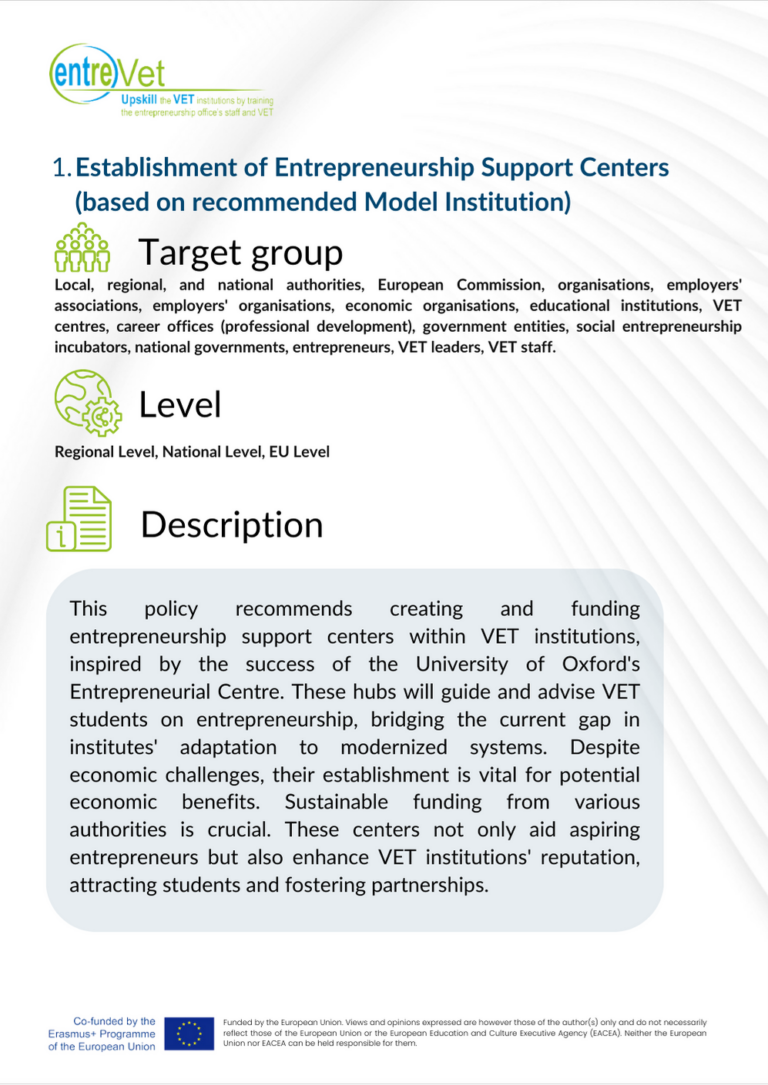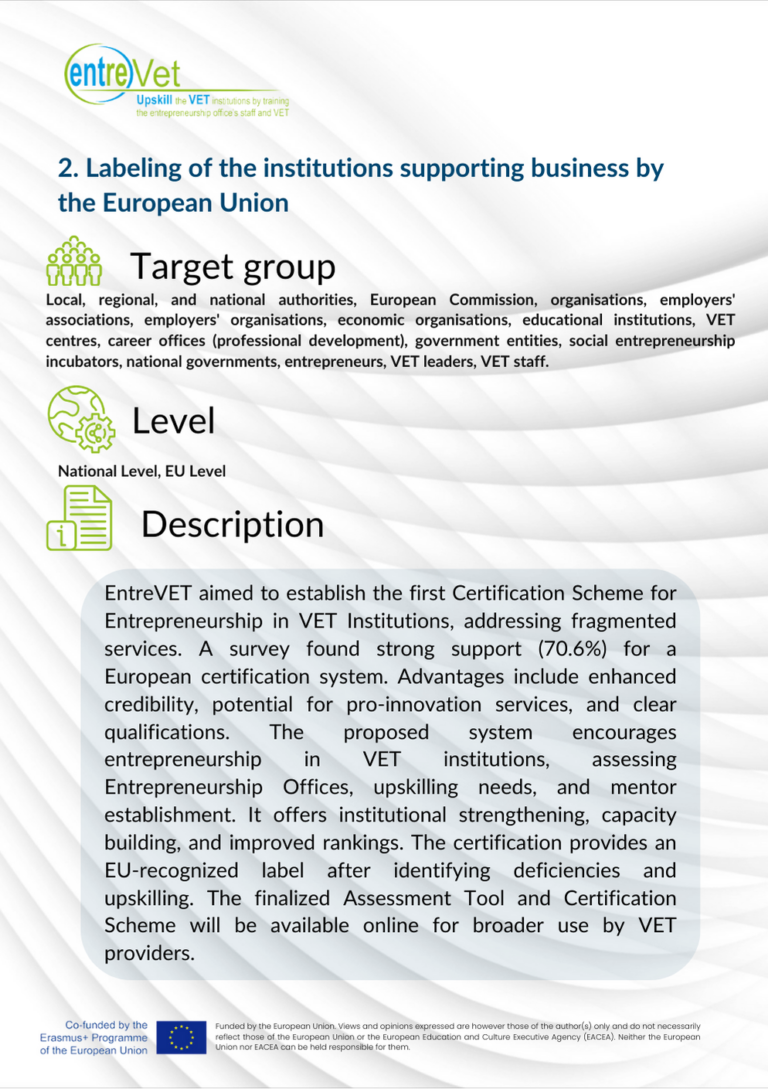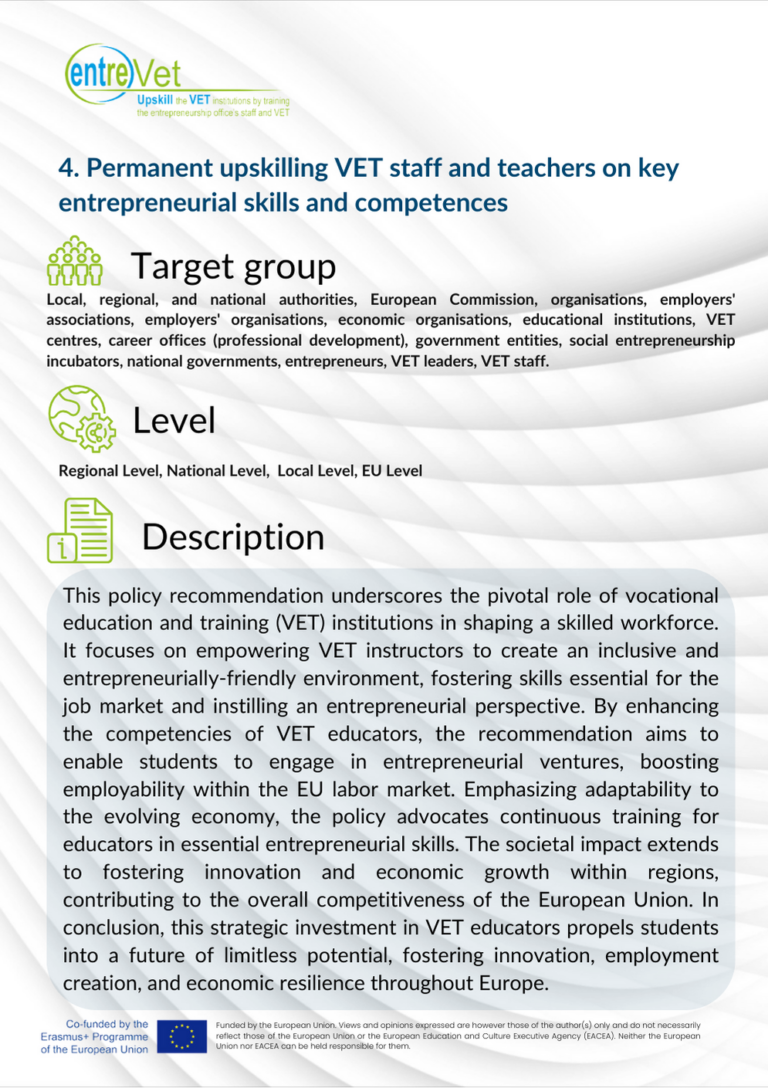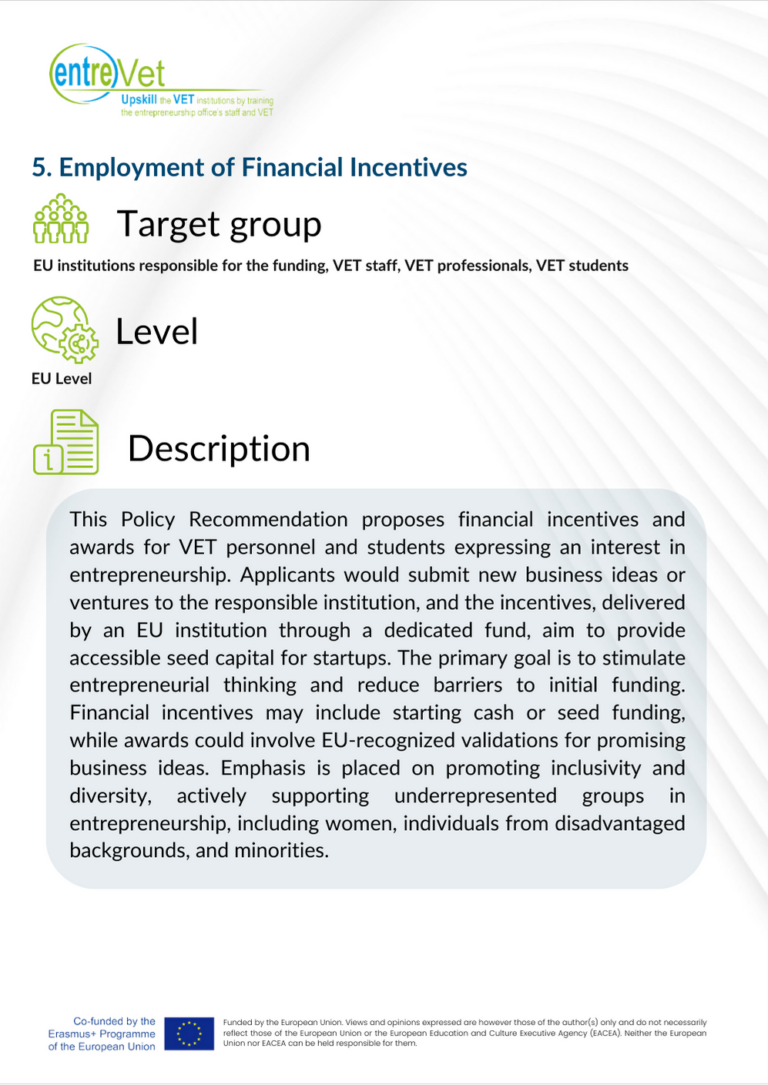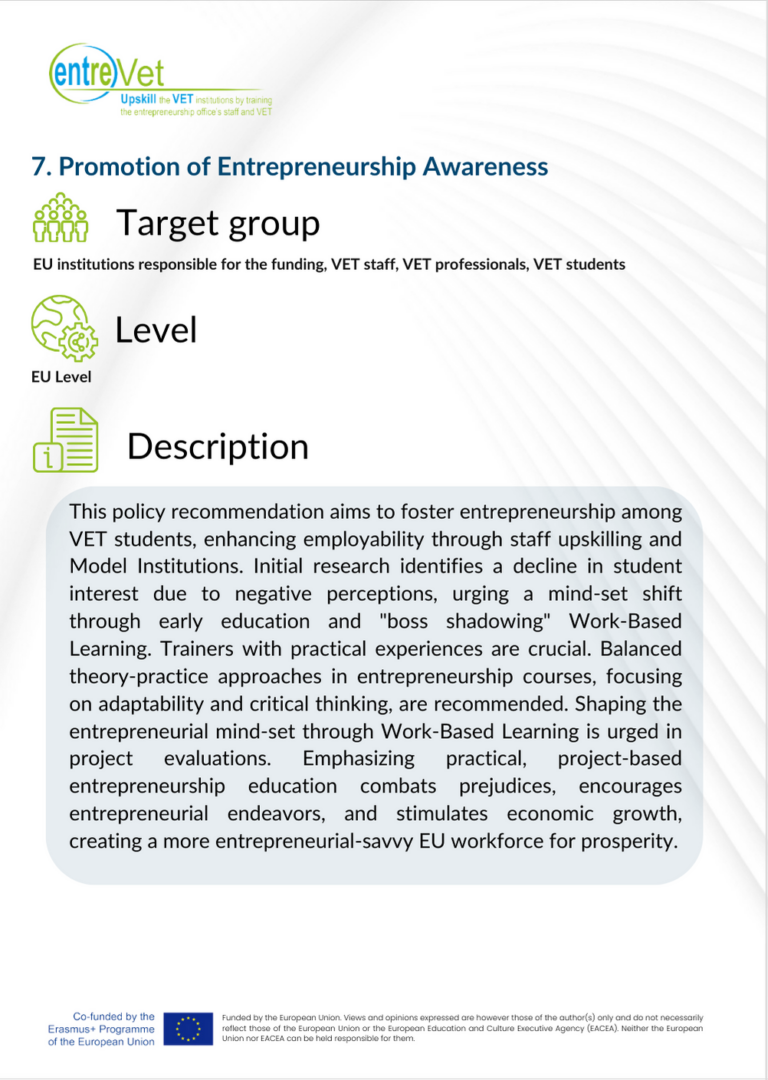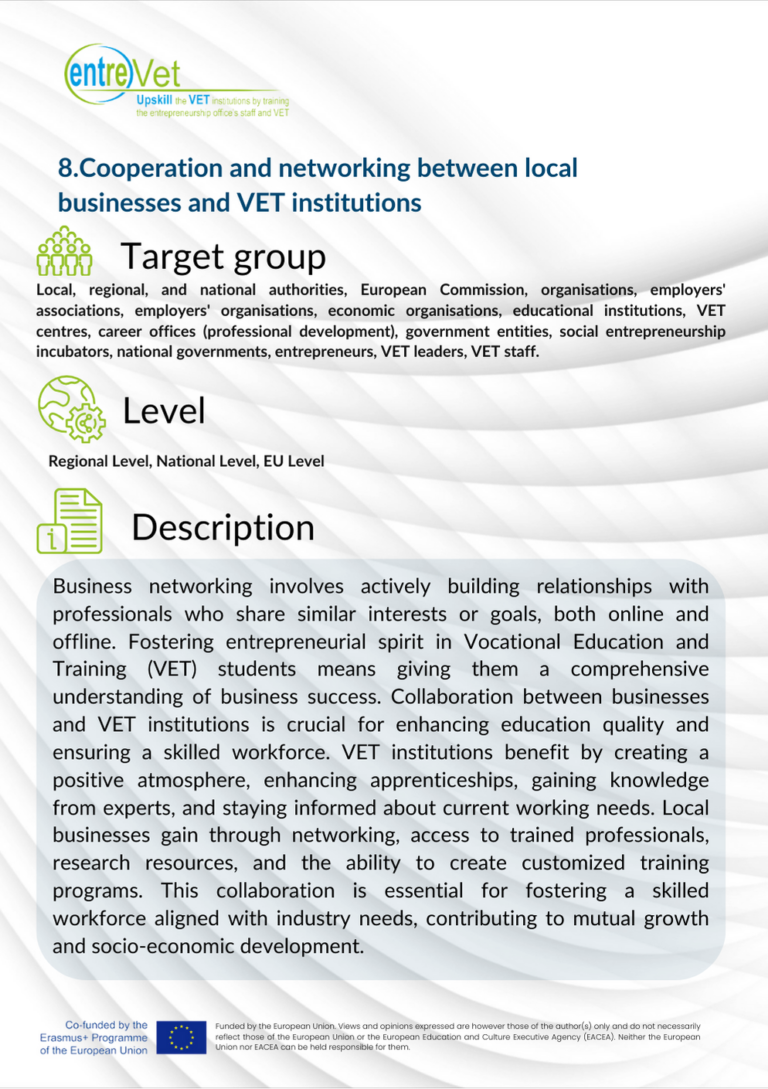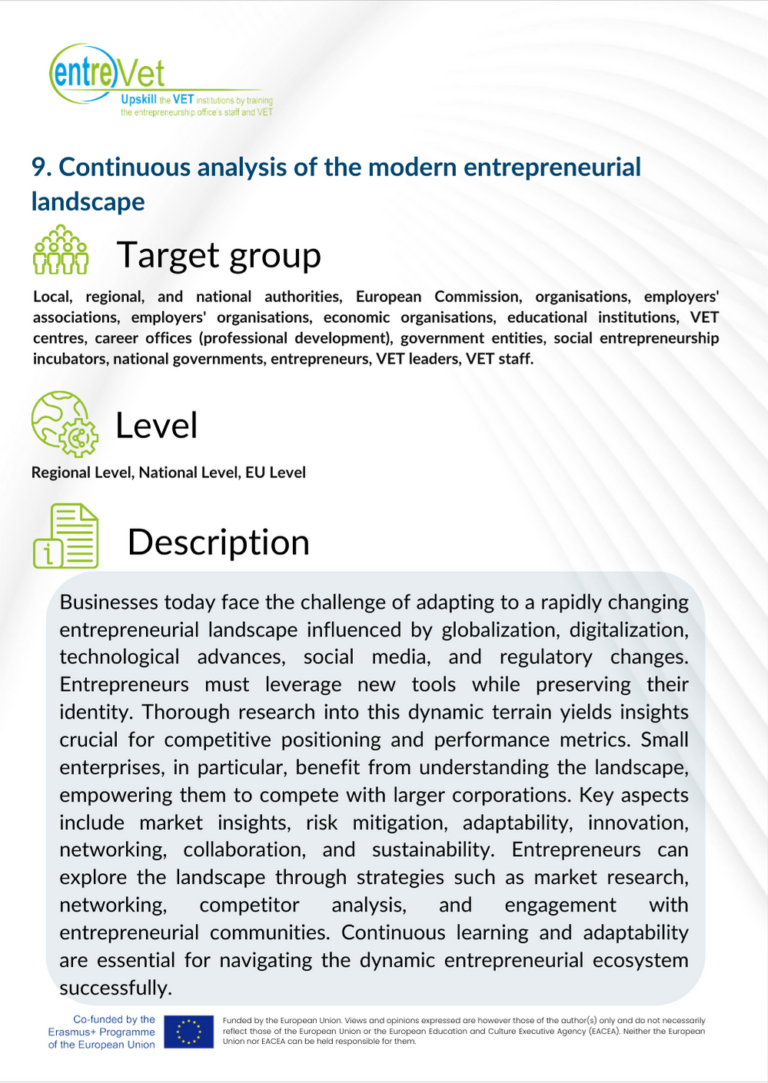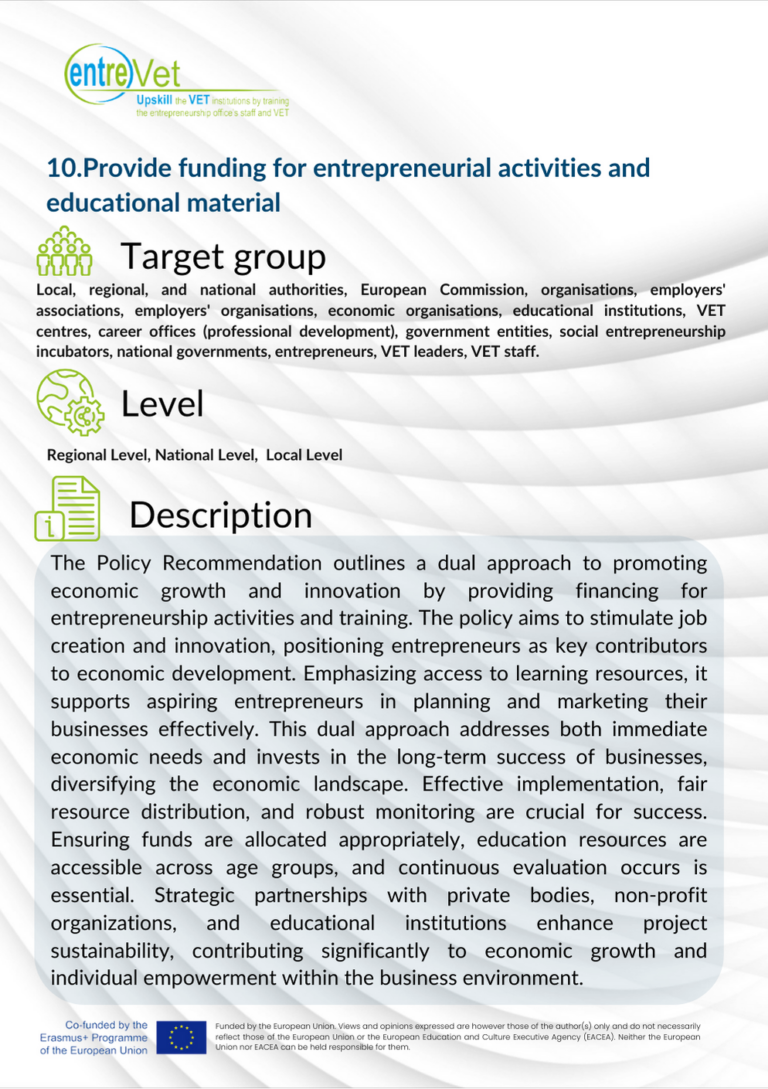
The horizontal goal of these recommendations is to create conditions for fostering of the entrepreneurial spirit among VET students, so as to improve their integration in the labor market.
The research work carried out as part of the project, the analysis of available literature and intensive work within the project partnership allowed to propose the following recommendations. Therefore, the following recommendations are proposed:
Recommendation Number 1 | |
Title | Establishment of Entrepreneurship Support Centres (based on recommended Model Institution) |
Target Group(s) | Direct: ● Local, regional and national authorities, ● European Commission, ● Organisations, employers’ associations, employers’ organisations, economic organisations, ● Educational institutions ● VET centres ● Career offices (professional development) ● Government Entities ● Social entrepreneurship incubators. ● National Governments ● Entrepreneurs Indirect: ● VET leaders, who will become aware of and create an entrepreneurship-friendly environment, within VET institutions ● VET Staff of the Office of Entrepreneurship of VET institutions, who are to be upskilled on the entrepreneurial practices they adopt in their working life. |
Application Level | The application level can be all: · Regional level · National level · EU level |
Analysis of the Recommendation | The objective of this policy recommendation is to introduce the general idea of creating and funding entrepreneurship support centres that will be inserted in VET institutions and will work as a guideline for entrepreneurs, they will provide them with consultations sessions, financial advice and resources as well as coaching services. It is true that VET students are not ready or even that interested in entrepreneurship due to the fact that institutes have yet to adapt to more modernised systems that target entrepreneurship and thus promote an entrepreneurial mindset that students need. The goal is to establish centres that will be properly equipped to enhance entrepreneurial skills and also direct those that are not sure about it and advise them. These centres will be a one-stop shop for people looking for advice and assistance in beginning their own businesses. Even though the economy might not be ideal for such initiatives, there is a strong sense of need to establish such centres as it will not only prove to be beneficiary to the regional, national and even European economy but it will assist in the making of new, confident entrepreneurs with a clear sense of direction. Established centres should have constant funding from local, regional, national or European authorities. Efforts should be made to create a European network of Support Centres that operate throughout the European Union. The University of Oxford /Saïd Business School has been implementing this initiative for a few years now with great success. The Entrepreneurial centre aims to support students on their entrepreneurial school journey by advising them and supporting their decisions on studying and following an entrepreneurial career. They manage to do that by thought leadership, access to local and international networks, and experiential learning. The Entrepreneurship Center supports student futures at Oxford Sad by collaborating with other departments to help students’ academic and extracurricular aspirations as well as their entrepreneurial aspirations. According to the 2022-2023 report they published, the results showed that more than 4,000 students engaged and almost 2,000 students actually participated in activities and events. These statistics show that the existence of this centre actually works and is proven to be beneficiary. Moreover, the foundation and implementation of these support centres can also benefit the institutions themself. Being one of the few VET institutions/ Schools/ Universities that have embedded in their strategies entrepreneurial support centres can increase their reputation and hence attract more students into enrollment. Another advantage would be the formation of new partnerships with larger institutions, organisations and even gaining larger funding for Local, National or even European authorities. |
Recommendation Number 2 | |
Title | Labeling of the institutions supporting business by the European Union |
Target Group(s) |
Direct: · Local, regional and national authorities, · European Union, · Organizations, employers’ associations, employers’ organizations, economic organizations, · Educational institutions, especially universities, · Career offices (professional development) · Government and local government agencies carrying out tasks in the field of entrepreneurship development. · Social entrepreneurship incubators.
Indirect: · VET leaders, who will become aware of and create an entrepreneurship-friendly environment, within VET institutions · VET Staff of the Office of Entrepreneurship of VET institutions, who are to be upskilled on the entrepreneurial practices they adopt on their working life. |
Application Level | The recommended level is at least the regional level. The optimal level of implementation of the certification system is: · National level, · European Union level. |
Analysis of the Recommendation | The main ambition of the EntreVET project was to create the first Certification Scheme for Entrepreneurship in VET Institutions, regarding their entrepreneurial capacities.
The reason for creating the proposal for a certification system for business environment institutions at the European Union level was the fact that currently these institutions operate in very different legal and organizational forms. When using support, a student receives very diverse services – implemented in various forms and contents. This is often a serious barrier to young people entering the labor market
A survey conducted as part of the EntreVET project (on a sample of 340 people associated with the VET industry) showed that as many as 70.6% of respondents support the development of a certification system for business environment institutions on the European Union scale. This solution is also supported by experts in the field of entrepreneurship education who participated in the focus study.
This allows us to argue that such a system is needed and both students and VET teachers expect the introduction of such a solution. The advantages of the certification and accreditation system include primarily increased credibility as a service provider for people who intend to run a host business, companies and as a partner for public institutions (including universities). Accreditation often also opens the possibility of providing pro-innovation services for small and medium-sized enterprises as part of projects financed by the European Union’s structural funds. In addition, it is important that the certificate indicates what qualifications the staff (advisors) should have. In addition, it is important that the certificate indicates what are the qualifications needed from VET staff. On the other hand, you should be careful because the main disadvantage of the certification system may be the excessive imposition of procedures and requirements that are not necessarily needed in a given institution (the process of bureaucratization of the sector).
A labelling or accreditation system for organizations should be developed that will actively encourage and promote entrepreneurship. This accreditation will inspire vocational education and training institutes to promote entrepreneurial instruction and support services.
We recommend that, in order for institutions to receive the certification, will be three-dimensional, on an organizational level, and it will assess the existence and/ or the current operations of the Entrepreneurship Office of the Institution, the need for up skilling of its staff and of the VET teachers and the need of up skilling or establishment of mentors of entrepreneurship within the institution. Furthermore, the certification scheme of a label of entrepreneurial capacity will offer the opportunity of institutional strengthening and entrepreneurial capacity building of the VET Institutions, as well as the possibility to improve their rankings. Certification system will, among others, boost the image and the ranking of the assessed VET institutions, while also being used as a reference point for future intervention in the updating of entrepreneurial operations, practices and capacities in the VET field.
VET institutions will be able to receive a label of entrepreneurship recognized by the European Union. This certification will be received after the identification of the entrepreneurial deficiencies and the upskilling of the VET teachers and staff. This task will produce the finalized and complete Assessment Tool, incorporating the Assessment and Evaluation Mechanism and the Certification Scheme, which will be made available online, for its exploitation by a wider network of VET provider. |
Recommendation Number 3 | |
Title | Development of Entrepreneurship Education Programs |
Target Group(s) | VET students: These are individuals who are typically seeking practical skills and knowledge to prepare them for specific careers or industries. In this case, the aim is to equip them with entrepreneurial skills and knowledge. The policy emphasizes the importance of students taking the initiative to develop their entrepreneurial skills. This empowerment encourages self-directed learning, initiative, and innovation—qualities that are vital for entrepreneurial success. VET faculty and educators: they need to be trained to effectively teach entrepreneurship concepts and guide students through the process. By training educators to teach entrepreneurship effectively, the policy promotes a broader transformation within the education system. It encourages the integration of entrepreneurship principles into the curriculum and teaching methods, potentially benefiting students across various subjects and programs. Students are the future entrepreneurs who will apply these skills in the real world, and educators are responsible for imparting this knowledge. Therefore, it’s crucial to target them directly. VET institutions: are essential players in implementing this policy. They can act as enablers and facilitators by providing the necessary support, resources, and infrastructure to enable effective entrepreneurship education. However, the ultimate goal is to equip individuals with the skills and knowledge they need to thrive in the entrepreneurial ecosystem. |
Application Level | This policy can be implemented at 3 different policy levels: Framework Development: The EU can play a crucial role in developing a framework or guidelines for entrepreneurship education within the member states. This framework can outline key competencies, learning objectives, and best practices for entrepreneurship education programs. Funding and Support: The EU can allocate funding and provide support for initiatives that promote entrepreneurship education. This can include grants for curriculum development, teacher training, and the creation of entrepreneurship networks. Quality Assurance: The EU can establish mechanisms for quality assurance in entrepreneurship education. This might involve setting standards, conducting evaluations, and sharing best practices across member states. At National Level: Curriculum Integration: National governments should integrate entrepreneurship education into the national education curriculum, including VET programs. This involves revising curriculum guidelines and standards to include entrepreneurship competencies (based on the EntreComp Framework). Teacher Training: Develop and implement teacher training programs to equip educators with the skills and knowledge necessary to teach entrepreneurship effectively. This might include partnerships with universities and training institutions. Funding Allocation: Allocate national funding to support entrepreneurship education initiatives, including the development of learning materials, online platforms, and entrepreneurship centres. At Regional Level: Local Networks: Create and support local networks of entrepreneurs, educators, and business leaders who can serve as mentors and resources for students. Encourage partnerships between schools and local businesses. Promotion and Awareness: Promote entrepreneurship as a viable career option within the region. Encourage participation in regional entrepreneurship competitions, innovation hubs, and start-up incubators. Customization: Regions within a country can customize entrepreneurship education programs to align with their specific economic and entrepreneurial landscape. Regional authorities can collaborate with local businesses to provide real-world experiences. |
Analysis of the Recommendation | Promoting entrepreneurship education is vital for economic growth and job creation. To achieve this, we should develop comprehensive entrepreneurship education programs for VET students and faculty. These programs should focus on essential skills like business planning, funding, team building, and partnerships. The VET system needs to adapt to prepare graduates for the job market and to ensure that they are not only job seekers but also job creators. Innovative teaching methods should be explored, like design thinking, online simulations, and mentor-led workshops. Emphasizing on the development of the initial business plan is crucial, with expert-guided workshops and interactions with experienced entrepreneurs. Continuous and localized assistance for aspiring entrepreneurs should be available at various points in their education journey. · Allocating resources to support VET entrepreneurship courses. · Providing financial assistance for structured company visits. · Encouraging entrepreneurship training for VET educators. · Developing guidelines for the seamless integration of entrepreneurship into vocational curricula. · Implementing incentives to motivate professors to promote student entrepreneurship. · Utilizing online courses and digital tools to enhance traditional classroom instruction. · Establishing networks among educators specializing in entrepreneurship to facilitate collaboration and promote professional development. · Establishing mentorship networks connecting experienced local entrepreneurs with students, offering guidance, advice, and real-world insights. · Creating resource hubs with access to entrepreneurial literature, market research data, and tools that students can use for their ventures. |
Recommendation Number 4 | |
Title | Permanent upskilling VET staff and teachers on key entrepreneurial skills and competences |
Target Group(s) | Direct: ● Local, regional and national authorities, ● European Commission, ● Organisations, employers’ associations, employers’ organisations, economic organisations, ● Educational institutions ● VET centres ● Career offices (professional development) ● Government Entities ● Social entrepreneurship incubators. ● National Governments ● Entrepreneurs Indirect: · VET Educators: including instructors, trainers, and academic faculty, engaged in VET institutions, colleges, and schools. · VET Institutions as they facilitate the implementation of upskilling programs for their staff. · Students: will benefit from educators who have enhanced entrepreneurial skills, as they will receive a more practical and comprehensive education. |
Application Level | · National · Local · Regional · EU Level |
Analysis of the Recommendation | Effective institutions of vocational education and training (VET) are crucial in defining the skills and competencies of the workforce. Staff members who are well-trained and motivated are the propelling force behind genuine improvements in the labor market readiness of VET students within these institutions. VET instructors occupy a distinct position among these educators, as they play a crucial role in fostering an inclusive and entrepreneurially-friendly environment within VET institutions. This conducive environment not only equips VET students with the skills necessary for success on the job market, but also fosters a culture of innovation and adaptability by instilling in them an entrepreneurial perspective. This policy recommendation seeks to enhance the role of VET institutions as drivers of economic growth by empowering VET educators to excel in their roles and equipping them with essential entrepreneurial skills and competencies.
This will enable VET students to engage in entrepreneurial endeavors, establish new businesses, and increase their employability, not only in their home countries but also in the broader European Union labor market. Contributing to the resilience and vitality of the EU labor market, this enables VET educators to serve as catalysts for their students’ transformational journeys.
In addition, this policy recommendation acknowledges the changing labor market landscape and the need for adaptable skills in the current globalized economy. It emphasizes the necessity for educators and VET institutions to proactively adapt to these changes. By providing VET educators with continuous training and opportunities for upskilling in essential entrepreneurial skills and competencies, we ensure that they continue to be at the vanguard of educational excellence.
The broader societal impact of VET educators who are adequately prepared is also highlighted at a great extent. By fostering an environment that fosters innovative thought and entrepreneurship, VET institutions serve as centres of economic development and growth in their respective regions. This not only benefits students but also contributes to the economic competitiveness of the European Union as a whole and has a positive effect on local communities.
In conclusion, this policy recommendation represents an investment in the future of vocational education and training from a strategic standpoint. It acknowledges the critical role that VET educators play in developing an entrepreneurial and competent workforce, thereby enhancing the standing of VET institutions as agents of progress and opportunity on the EU labor market. This policy recommendation propels VET students into a future of limitless potential by equipping VET educators with the skills and mindset required for success in the modern economy, thereby fostering innovation, employment creation, and economic resilience throughout Europe. |
Recommendation Number 5 | |
Title | Employment of Financial Incentives |
Target Group(s) | Direct: · EU institutions responsible for the funding Indirect:
|
Application Level |
|
Analysis of the Recommendation | This Policy Recommendation refers to financial incentives and awards for VET personnel and students who display an interest in entrepreneurship. In an effort to foster the entrepreneurial spirit and creative thinking, and support individuals from diverse backgrounds. This policy recommendation targets the establishment of formal incentive sand awards that would financially motivate people to take over entrepreneurial ventures. Application Process The interested parties who which to apply for this funding would need to present a new business idea or a new venture to the institution responsible for the provision of the incentives. A specific template and guidelines for the application would be provided. The incentives will be delivered by an EU institution or other local, regional and national structures, depending on the local priorities. At the same time, depending on the level and the size of the fund, different financing amounts will be made available to entrepreneurs. Types of Incentives In each level, a dedicated fund will be established which will be used to provide seed capital and early-stage funding for startups. This fund should be accessible to entrepreneurs from diverse backgrounds and industries. This would stimulate the development of a broad spectrum of entrepreneurial initiatives that could support the economic development. Incentives could take the form of seed funding, start-up loans, subsidies, award sand tax incentives. In the case of financial incentives, these can include starting cash or seed funding, depending on the business idea presented. In case of awards, these can include EU-recognized awards that would serve as a validation that the business idea is promising. Main Objective The main goal of the incentives would be to stimulate the entrepreneurial thinking and minimize the barriers faced by aspiring entrepreneurs in securing initial funding. Implementation 1.Provision of financial incentives through VET institutions, to increase the access to the decried target group 2.Establish pre-defined selection criteria for the attainment of the funds, to ensure the transparency of the process 3.Combine the provision of financial incentives with other types of incentives, such as mentorship programs and continuous training opportunities. 4.Monitor the impact of the rewards and incentives, to ensure the optimization of the program 5.Heavily disseminate the program in order to ensure that a large number of skilled individuals would join. Overall, inclusivity and diversity will be actively promoted as underrepresented groups in entrepreneurship will be supported, such as women, individuals from disadvantaged backgrounds and minorities. |
Recommendation Number 6 | |
Title | Fostering of industry and international partnerships |
Target Group(s) | Direct: ● Local, regional and national authorities, ● European Union Institutions, ● Industry Associations and Chambers of Commerce, ● Startups and Innovation Hubs, ● Organisations, employers’ associations, employers’ organisations, economic organisations, ● Educational institutions, especially universities, ● VET centres ● Career offices (professional development) ● Social entrepreneurship incubators. ● Government and local government agencies carrying out tasks in the field of entrepreneurship development. ● Entrepreneurs Indirect: ● VET leaders, who will become aware of and create an entrepreneurship-friendly environment, within VET institutions ● VET Staff of the Office of Entrepreneurship of VET institutions, who are to be upskilled on the entrepreneurial practices they adopt in their working life. |
Application Level | The application level can be all: · Regional level · National level · EU level |
Analysis of the Recommendation | The recommendation aims to encourage and facilitate partnerships between industries and international entities. It recognizes the strategic importance of such collaborations in driving economic growth, innovation, and global competitiveness. The proposal acknowledges the existing diversity in legal structures and organizational forms among business environment institutions operating within the European Union. These variations can result in differences in the services provided to students, posing potential barriers to young individuals entering the job market. Benefits associated with fostering industry and international partnerships could include increased trade opportunities, knowledge sharing, access to new markets, and a more competitive business environment. Additionally, such partnerships may stimulate job creation and economic growth. There may be challenges related to differing regulations, cultural nuances, and economic conditions when establishing international partnerships. Careful planning and risk assessment will be essential to address these challenges effectively. The recommendation should include details on the mechanisms and frameworks through which industry and international partnerships will be encouraged and facilitated. These could include trade agreements, collaborative research initiatives, and investment promotion programs. To ensure the recommendation’s effectiveness, it’s essential to establish monitoring and evaluation mechanisms. Key performance indicators (KPIs) should be identified to assess progress and adjust strategies as needed. Adequate funding and resources should be allocated to support the implementation of this recommendation. This may include budget allocations for partnership development programs, trade missions, and market research efforts. The recommendation should emphasize the importance of active international engagement and diplomacy to promote partnerships with entities outside the EU. Bilateral and multilateral agreements can be instrumental in this regard. Consideration should be given to education and capacity-building programs for businesses and institutions interested in international partnerships. These programs can help stakeholders navigate the complexities of global markets. The recommendation should also encourage sustainable and inclusive practices in international partnerships, considering environmental and social aspects. This ensures that the benefits are widely distributed and long-lasting. In summary, the analysis of the recommendation for “Fostering Industry and International Partnerships” underscores its strategic importance in promoting economic growth and global competitiveness. The success of this recommendation will depend on stakeholder support, effective collaboration mechanisms, careful monitoring, and adequate resource allocation. It should aim to overcome challenges associated with international partnerships and leverage their potential for the benefit of the European Union and its industries.
|
Recommendation Number 7 | |
Title | Promotion of Entrepreneurship Awareness |
Target Group(s) | Direct: · Local, regional and national authorities, · European Union, · Organizations, employers’ associations, employers’ organizations, economic organizations, · Educational institutions, especially universities, · Career offices (professional development) · Government and local government agencies carrying out tasks in the field of entrepreneurship development. · Social entrepreneurship incubators.
Indirect: · VET leaders, who will become aware of and create an entrepreneurship-friendly environment, within VET institutions · VET Staff of the Office of Entrepreneurship of VET institutions, who are to be upskilled on the entrepreneurial practices they adopt on their working life. |
Application Level | European Union level addressed to policymakers. |
Analysis of the Recommendation | We present the following policy recommendations based on the findings of the EntreVet project, a focused initiative aimed at nurturing the entrepreneurial spirit among Vocational Education and Training (VET) students. The primary goal of this endeavour is to enhance their employability by upskilling VET staff and teachers in essential entrepreneurial capacities, thereby creating a Model Institution. This, in turn, will empower VET educators to impart entrepreneurial skillsets to students, enabling them to explore new business opportunities and potentially realize their entrepreneurial ambitions.
The initial research conducted during the project’s first phase revealed a critical challenge: the declining interest among students in pursuing entrepreneurial careers. This decline can be attributed to the negative perception associated with entrepreneurship. Entrepreneurship is often perceived as a choice fraught with disadvantages, such as irregular working hours, high taxes, excessive bureaucracy, and complex practices that inadvertently promote tax evasion. These factors deter students from embracing entrepreneurship as their first career choice. To address this issue, we recommend a fundamental shift in mind-set regarding entrepreneurship. It is crucial to instil an entrepreneurial mind-set from an early age, fostering an awareness that innovative ideas can translate into viable businesses. This process should also encompass an understanding of the possibility of failure and the determination required to avoid it. One way to achieve this is through early education programs that introduce students to the concept of entrepreneurship, showcasing success stories, and familiarizing them with the concept of entrepreneurial resilience. By exposing young individuals to role models and engaging them in activities that foster creativity and innovation, we can plant the seeds of entrepreneurship early in their educational journey.
To facilitate this shift, we propose the introduction of Work-Based Learning as a means to develop an entrepreneurial mind-set. It is essential for students to acquire the necessary entrepreneurial skillset through dialectic interaction with a role model, whether parents, relatives and friends, or a business owner that acts as a trainer/teacher and mentor. In this light, trainers and educators responsible for teaching entrepreneurship should themselves possess practical entrepreneurial experiences, as prerequisite to ensuring effective instruction.
In addition to entrepreneurial experience, VET staff and teachers should receive specialised training in entrepreneurship pedagogy. A strong emphasis on continuous professional development is essential to equip them with the latest knowledge and techniques for teaching entrepreneurship effectively.
We advocate a balanced approach that blends theory with practical experiences, enabling students to apply theoretical knowledge in real-life situations. This should entail students spending at least 60% of their time engaging in practical experiences alongside entrepreneurs, an approach we refer to as “boss shadowing.” This model equips students with hands-on insights into entrepreneurship and instils the confidence to pursue their entrepreneurial ambitions. Incorporating entrepreneurial elements within the curriculum is vital.
Entrepreneurship courses should be project based, focus on problem-solving, critical thinking, innovation, and risk management. Students should learn not only how to start a business, but also how to adapt to changing market conditions, navigate regulations, operational failures, critical time and quality performances, critics and expectations of clients, cash-flow constraint, etc. This seems to us being the best way to create sustainable enterprises. These skills are indispensable in an ever-evolving business landscape.
In light of these findings, we recommend shaping the introduction to the entrepreneurial mind-set through Work-Based Learning. We urge policymakers to consider e.g. also concepts like boss shadowing when evaluating projects related to Vocational Education and Training. The inclusion of Work-Based Learning and the presence of VET staff with relevant entrepreneurial experiences should be essential criteria for project financing approval. A more organized practice-based approach to entrepreneurship education is pivotal in combating prevailing prejudices against entrepreneurship. It also serves to encourage individuals to embrace entrepreneurial endeavours. Emphasis should be placed on creating an environment that facilitates established enterprises. By nurturing existing businesses and streamlining procedures, we can effectively promote entrepreneurship and stimulate economic growth.
In conclusion, the Entrepreneurial mind-set and Work-Based Learning are key elements in the promotion of entrepreneurship awareness among VET students. By implementing these recommendations and investing in institutions that support businesses, the European Union can foster a more entrepreneurial-savvy workforce and pave the way for economic prosperity. |
Recommendation Number 8 | |
Title | Cooperation and networking between local businesses and VET institutions |
Target Group(s) | Direct: · Local, regional and national authorities, · European Commission, · Organisations, employers’ associations, employers’ organisations, economic organisations, · Educational institutions · VET centres · Career offices (professional development) · Government Entities · Social entrepreneurship incubators. · National Governments · Entrepreneurs · Local businesses Indirect: · VET leaders, who will become aware of and create an entrepreneurship-friendly environment, within VET institutions · VET Staff of the Office of Entrepreneurship of VET institutions, who are to be upskilled on the entrepreneurial practices they adopt in their working life.
|
Application Level | The application level can be all: · Regional level · National level · EU level
|
Analysis of the Recommendation | There is an actual term called Business Networking which refers to the building process and efforts in order to establish relationships with professionals and experts on a certain subject that share the same interest, passion or have common profit goals. It requires constant effort and opportunity identification that will result to connecting with others, either online or offline, possible collaboration and expansion of professional circle. Networking includes attending conferences, events, having an online presence, creating collaborations with local businesses and anything else that provides exposure.
Fostering the entrepreneurial spirit in VET students means presenting them with a well round view of what entrepreneurship means. During their learning time they should be able to comprehend the needs of a successful business and how to achieve that.
Collaboration between businesses and vocational education and training (VET) institutions holds significant importance for enhancing educational quality and ensuring that upcoming workforce possesses the skillsets required by companies. VET stands as a pivotal factor in addressing various critical issues confronting Europe, including competitiveness, youth joblessness, and social integration.
Benefits for VET institutions: 1) Creates a positive atmosphere and increases attractiveness to third parties Spreading the word that a VET institution collaborates with businesses can have a pivotal role in the decision making of future students to enroll in the institution. 2) Enhances apprenticeships and improves working skills Creates apprenticeships positions for VET students and enables the upskilling of them. 3) Gaining knowledge and practical tips from experts and businesses VET students will have the possibility to practise under experienced professionals and gaining practical experience that will be of use to them in the future 4) Being the first to know the current needs of future working personal and adjusting accordingly Working closely with local businesses can help institutions have an in-depth knowledge on the current working needs.
Benefits for local businesses: 1) Networking and publications of their business in the local market/area This collaboration can work as a marketing tool for the businesses and boost their presence 2) Having access to newly trained professionals and possible work reinforcement Partnering with VET institutions provides access to a pool of well-trained, job-ready graduates with relevant skills tailored to the needs of the local industry. 3) Access to research and resources VET institutions often have access to research, facilities, and resources that businesses can leverage for innovation, development, or solving industry-specific problems. 4) Create and customize training programs Businesses can suggest and co-create training programs targeted on a specific need according to their needs.
The collaboration between local businesses and vocational education and training (VET) institutions is pivotal for fostering a skilled workforce aligned with industry needs. This policy recommendation aims to outline measures to strengthen and formalize the cooperation and networking between these entities for mutual benefit and socio-economic growth.
|
Recommendation Number 9 | |
Title | Continuous analysis of the modern entrepreneurial landscape |
Target Group(s) | Direct: · Local, regional and national authorities, · European Commission, · Organisations, employers’ associations, employers’ organisations, economic organisations, · Educational institutions · VET centres · Career offices (professional development) · Government Entities · Social entrepreneurship incubators. · National Governments · Entrepreneurs · Local businesses Indirect: · VET leaders, who will become aware of and create an entrepreneurship-friendly environment, within VET institutions · VET Staff of the Office of Entrepreneurship of VET institutions, who are to be upskilled on the entrepreneurial practices they adopt in their working life.
|
Application Level | The application level can be all: · Regional level · National level · EU level
|
Analysis of the Recommendation | By analysing the current state of the entrepreneurial landscape, businesses are acquiring the quality to visualize the current state of entrepreneurship in order to stay afloat to the constantly changing environment. Globalization, digitalization, technological advances, social media, sharing economy, regulatory changes, gig economy and crowdfunding have severely impacted the entrepreneurial landscape. Entrepreneurs are now being to challenge to use new tools in a way that works for them and the business but without losing their identity.
Exploring the landscape through thorough research can provide valuable insights into competitive positioning, business types, and their performance metrics. Comprehensive understanding of this terrain holds significance across all business scales. However, it proven to be of great importance for smaller enterprises, empowering them to cultivate competitiveness, foster innovation, and assert themselves as a competition against larger corporations. Understanding the multiple levels of the landscape, arms smaller businesses with the tools to navigate challenges, seize opportunities, and carve their niche within the market.
It can also provide data regarding the: · Market Insights · Risk mitigation · Adaptability · Innovation · Networking and collaboration · Sustainability
Entrepreneurs can explore the business landscape using a variety of strategies. These include conducting extensive market research through surveys, interviews and data analysis to understand consumer behaviour, industry trends and competitor analysis. Active participation in industry events, networking and engagement with entrepreneurial communities provides first-hand insights and trends. Analysing competitors’ strategies and market positioning, as well as accessing industry reports, publications and online resources, helps to understand market dynamics. Seeking mentorship, forming partnerships and using customer feedback are also key contributors. Access to government and industry reports adds to this knowledge base and promotes a broad understanding. Continuous learning, adaptability and a curious mindset remain critical for entrepreneurs to navigate and thrive in the dynamic entrepreneurial ecosystem. |
Recommendation Number 10 | |
Title | Provide funding for entrepreneurial activities and educational material |
Target Group(s) |
Direct: · Local, regional and national authorities, · European Commission, · Organisations, employers’ associations, employers’ organisations, economic organisations, · Educational institutions · VET centres · Career offices (professional development) · Government Entities · Social entrepreneurship incubators. · National Governments · Entrepreneurs
Indirect: · VET Educators: including instructors, trainers, and academic faculty, engaged in VET institutions, colleges, and schools. · VET Institutions as they facilitate the implementation of upskilling programs for their staff. · Students: will benefit from educators who have enhanced entrepreneurial skills, as they will receive a more practical and comprehensive education. |
Application Level | The application level can be all: · National · Local · Regional
|
Analysis of the Recommendation | A common approach to promoting economic growth and innovation is reflected in the Policy Recommendation, which establishes how financing for entrepreneurship activities and training should be provided. The policy aims at stimulating job creation and innovation, with the aim of positioning entrepreneurs as a major contributor to economic development by promoting financial support for entrepreneurship. At the same time, an emphasis on learning resources is also reflected in a commitment to providing aspiring entrepreneurs with access to knowledge that will help them plan and market their business more effectively. This dual approach not only addresses immediate economic needs, but invests in the long-term success and resilience of businesses which are a potential diversification of the economy’s landscape.
Effective implementation, fair distribution of resources and the establishment of strong monitoring and evaluation mechanisms are essential if this policy is to succeed. Ensuring the appropriate allocation of funds, access to education resources in a diverse age group and continuous evaluation of the impact of these initiatives will be essential. Moreover, strategic partnerships with private bodies, not for profit organisations and educational institutions could increase the project’s sustainability. This recommendation can contribute significantly to economic growth and empowerment for individuals within a business environment through supporting an ecosystem of entrepreneurship.
|

Policy Recommendations Cards
